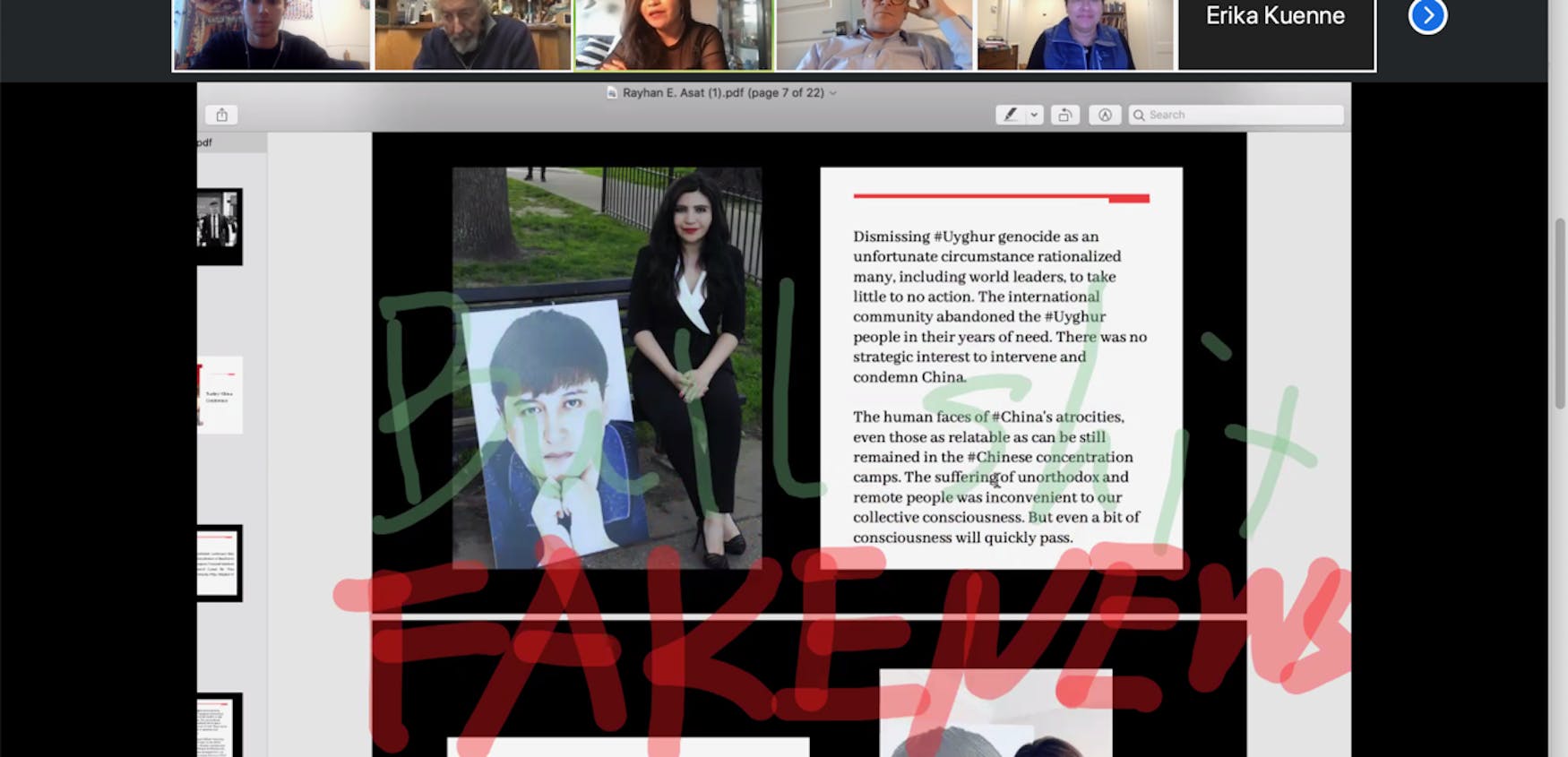Brandeis students can play a role in the fight for Uyghurs’ rights in Northwest China
On Nov. 13, some attendees at a Brandeis-hosted panel on human rights violations in the Xinjiang Uyghur Autonomous Region of China zoombombed my friend Rayhan Asat. As she began to tell the story of her brother, Ekpar Asat, who has been detained by the Chinese government for five years, despite never being charged with a crime, Rayhan’s voice was drowned out by the Chinese national anthem. Her screen was hijacked with annotations reading “bullshit” and “fake news.” That night, she had nightmares.
Rayhan’s family is one of the millions of Uyghur families who have been torn apart by the Chinese government’s persecution of ethnic minorities in the country’s northwest. Since 2017, the government has detained more than a million Uyghurs in concentration camps. A Feb. 2 report from the BBC tells of systematic rape of women in these camps. A video shot by drone several years ago shows scores of Uyghur men being lined up and marched onto trains. In the video, the men’s heads are all shaved. That may be one reason why the footage resurfaced online shortly after Customs and Border Protection seized several tons of human hair at the border. Those wigs would not be the only consumer product tainted by these atrocities: one-fifth of all cotton garments now produced by Uyghur forced labor. Companies like Apple and Coca-Cola have spent millions of dollars lobbying against efforts to crack down on the importation of such tainted goods.
That is what Rayhan was talking about when she was interrupted. She was making an appeal to her fellow Americans to use our influence as citizens of the most powerful nation in the world to help move this crisis toward the least-bad resolution possible — one in which her brother is alive and free. She appealed to us as consumers as well, to be mindful of how we spend our money and what atrocities might be hiding in the supply chains of our products. In short, she urged us to do something. These horrors have been unfolding for years, and not nearly enough has been done.
I met Rayhan through my own attempts to do something, anything, about this crisis. Last summer, I was passing around an open letter calling for passage of the Uyghur Forced Labor Prevention Act, a major initiative that, despite nearly universal support, still has not passed in Congress. It was mostly going around the Jewish community when I connected with students at other schools who were doing the same thing. We coalesced under the name “Jewish Movement for Uyghur Freedom,” and Rayhan was one of the Uyghur advocates who agreed to serve on our team of advisors.
In the half a year or so since that group coalesced, we’ve put in a good deal of effort to galvanize the Jewish community. We’ve published a number of articles in the Jewish press, made calls to action that have been shared by elected officials, raised money for Uyghur refugee relief efforts in Turkey and attended lobbying sessions to push for UFLPA and other legislative efforts to deal with this crisis. Now, we are finally working to expand beyond our core group and beyond the Jewish community. We’ve decided that, like many forms of activism, it would be good to start this effort on campuses. After what happened to Rayhan last fall, I think Brandeis has a unique interest in making things right by putting together a particularly strong chapter of this emerging student network.
Starting next week, I will be leading weekly Zoom gatherings for Brandeis students who want to get involved in advocacy for the Uyhghur people in Xinjiang. We will meet for about an hour each week. At each meeting, we will discuss the latest news on the unfolding crisis in Xinjiang. Then, we will spend some time taking action: calling congresspeople one week, fundraising for relief efforts another, organizing physical demonstrations for those who are able to attend. The rest of the time will be spent discussing strategy for what to do going forward. This sort of grassroots attention has been sorely missing for the last several years, despite the tireless work of Uyghur advocates.
I should note that there were concerns raised by some Chinese students, prior to Rayhan’s event last fall, about potential inaccuracies or inflammatory statements in the event that might make our community less safe for them. I want to extend an invitation to Chinese students in particular to please reach out to me if you have such concerns. There are particulars about this situation that I, as someone who is neither from China nor a speaker of either Uyghur or any dialect of Chinese, am likely not to pick up on.
We will not be the only chapter of this emerging network. Students at Harvard University, Yale University and the University of Chicago are also starting chapters right now, and more will follow in the coming weeks. But, like I said, the Brandeis community can make a unique contribution.
If you’d like to be involved in this chapter, please email me at leonkraiem@gmail.com for a Zoom link. Join us on Facebook at “Brandeis Students for Human Rights in the Uyghur Region,” both the page and the group. There is no time to waste getting this project off the ground — there is much to be done.



Please note All comments are eligible for publication in The Justice.